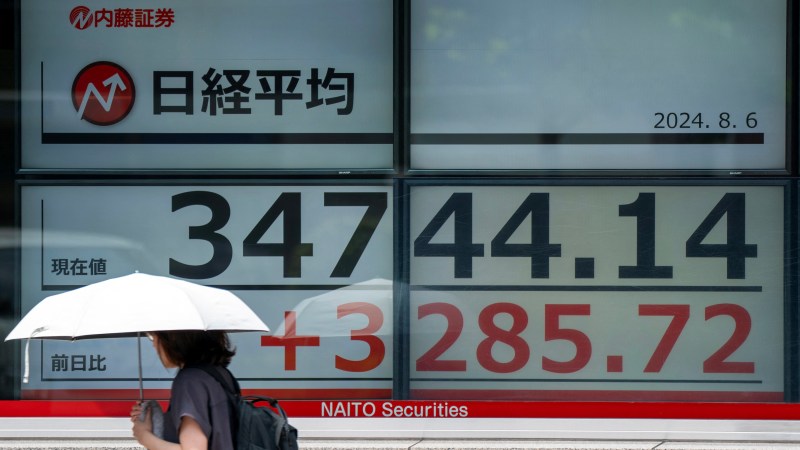FTSE 100 flat as stock market rebound fades
London’s stock market gave up early gains after a rebound in Asia following yesterday’s global sell-off faded.
The FTSE 100 started the day around 40 points higher but before midday was trading up 3 points, or 0.04 per cent, at 8,011.23. The more UK-focused FTSE 250 gained 70 points, or 0.36 per cent, at 20,310.47.
Markets in Germany and France slid 0.15 per cent and 0.55 per cent respectively. Futures markets point to US markets opening higher.
The early bounce in Asia followed a 10.2 per cent rise in Tokyo’s Nikkei 225, by 3,217.04 points, to 34,675.46 after closing down 12.4 per cent on Monday in its biggest one-day fall since the 1987 Black Monday crash.
South Korea’s Kospi added 3.8 per cent and Australia’s ASX 200 gained 0.4 per cent. Markets in Hong Kong and mainland China were flat.
The yen weakened a little against the dollar this morning. The currency’s sharp rally against the dollar over the past month was blamed for the stock market rout.
A stronger yen caught out hedge funds, which had been using a so-called carry trade — borrowing money in economies with low interest rates such as Japan to fund investments in higher-yielding assets elsewhere — to make easy profits. A stronger yen led to an aggressive unwinding of the carry trade, adding to market volatility.
Mark Dowding, chief investment officer at BlueBay Asset Management, said he thought a number of macro funds — giant hedge funds that make bets on currencies and securities prices — “have been caught the wrong way around on a trade”.
Super-lax Japanese monetary policy has led to a boom in cross-border yen borrowing to fund trades elsewhere, according to the Dutch bank ING. Official data from the Bank for International Settlements suggested the practice had increased by $742 billion since the end of 2021, the bank noted.
Global markets have been unsettled since last week when poor US manufacturing and jobs data raised concerns about a possible US recession. The figures were taken as a sign that the world’s biggest economy was slowing because the US Federal Reserve had kept interest rates too high for too long.
Austan Goolsbee, president of the Chicago Federal Reserve Bank, settled nerves last night when he said that Friday’s weak July jobs report did not signal a recession. While Mary Daly, president of the San Francisco Federal Reserve, said it was “extremely important” to prevent the labour market tipping into a downturn. Daly said her mind was open to cutting interest rates as necessary and policy needed to be proactive.
Chris Beauchamp, the chief market strategist at IG, said: “If you wake up in the morning to discover that Japan is down 10-12 per cent, it’s going to scare the daylights out of the sanest person in the world, so it’s understandable that people take flight.
“On the flipside, I think people got a bit carried away yesterday and it always seems very dramatic at the time. It’s normal to see weakness this time of year. The question is – was that enough to reset markets or is there going to be more?”
Several trillion dollars were wiped from the value of share prices worldwide in yesterday’s rout. On Wall Street, the S&P 500 had lost 3 per cent, with the Nasdaq Composite down 3.4 per cent.
Some of the biggest US technology stocks added to the toll of losses. Amazon lost 4.1 per cent. Nvidia, which designs artificial intelligence chips, fell another 6.4 per cent and has now fallen 29 per cent from its high in June. The latest stock price fall was compounded after the company and its main supplier Taiwan Semiconductor Manufacturing Company were reported to be facing production challenges.
In London, the FTSE 100 ended Monday down 166 points, or just over 2 per cent, at 8,008, its worst single-day points loss since mid-March last year. The CAC 40 in France closed 1.4 per cent lower while the German Dax slid by 1.8 per cent.






